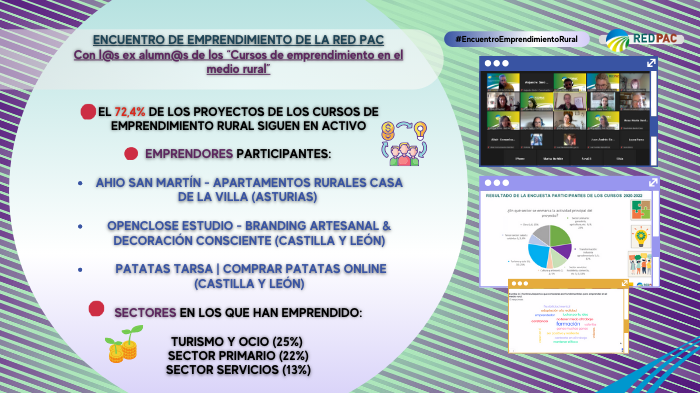
09 de October de 2023
Dinamización rural
The day's program gave rise to a reciprocal exchange of experiences around projects that had entered the embryonic phase of the courses and were now in full development.
- The PAC Network has brought together alumni from the 7 editions of the "Entrepreneurship Courses in Rural Areas" organized so far.
- It has been found that 72.4% of the embryonic projects submitted to entrepreneurship courses are still active.
- The 8th edition of a new "Rural Entrepreneurship Course" will be held soon.
“Even though we're far away and behind a screen, we can get closer.” This is how student Maribel, from Open Close Estudio, expressed herself at the “Entrepreneurship Meeting” organized by the PAC Network on October 5th. At this meeting, the PAC Network brought together alumni of the seven previous editions of the “Entrepreneurship Courses in Rural Environments” organized over the past three years by the former National Rural Network (RRN).
Thanks to this meeting, former participants were able to meet again and network with those they hadn't met in their respective editions. Ultimately, it created an opportunity to create a rural entrepreneurship network.
Thus, the day's program, following a brief presentation of the PAC Network, gave rise to a reciprocal exchange of experiences regarding projects that had entered the initial phase of the courses and were now in full development. Namely:
- Ahio San Martin – “Casa de la Villa Rural Apartments” (San Martín de Oscos, Asturias), by Ena Victoria Mateos González: rural accommodation consisting of 8 apartments.
- OpenClose Estudio – Artisanal Branding & Conscious Decoration (Castilla y León), by María Isabel Macía Hidalgo: business focused on the production of sculptures and decorative pieces.
- Tarsa Potatoes - Buy potatoes online (Castilla y León), by Gema Panizo: dedicated to the cultivation and sale of high-quality potatoes for consumption and the training of young farmers.
Exchange of experiences
The speakers on the panel of successful entrepreneurship experiences in rural areas shared with their colleagues challenges and advice based on their own experiences. Among the most frequently mentioned challenges were:
- Excessive bureaucracy in the management of subsidies.
- The amount of time required to invest in the project.
- The loneliness they sometimes face along the way.
Among the most repeated advice :
- Task prioritization.
- Network and make lots of contacts.
- Have faith in the project.
- Combine your business with other activities that can provide you with additional sources of remuneration and/or personal satisfaction.
The students agreed that the "Entrepreneurship Courses in Rural Areas" had been very useful, providing them with direct advice throughout their short careers, as well as providing them with contact information from the faculty to address questions and difficulties even after the courses had finished, and providing them with a theoretical framework that they would not have had otherwise.
Statistics
Thanks to the meeting, we learned that 72.4% of the projects in the theoretical phase submitted to the entrepreneurship courses were currently active. Furthermore, the dynamics employed during the event yielded very significant data:
Sectors in which students have undertaken the courses:
- Tourism and leisure (25%)
- Primary sector (22%)
- Service sector (13%)
- Agri-food processing and industry: 12%
- Third sector (health and care): 8%
- Culture and crafts: 2%
Regarding the factors they consider key to starting an initiative, attendees stated that it requires training, enthusiasm and perseverance, and a positive and resilient attitude. The meeting included an activity that included improvements and suggestions for future editions of the course.









